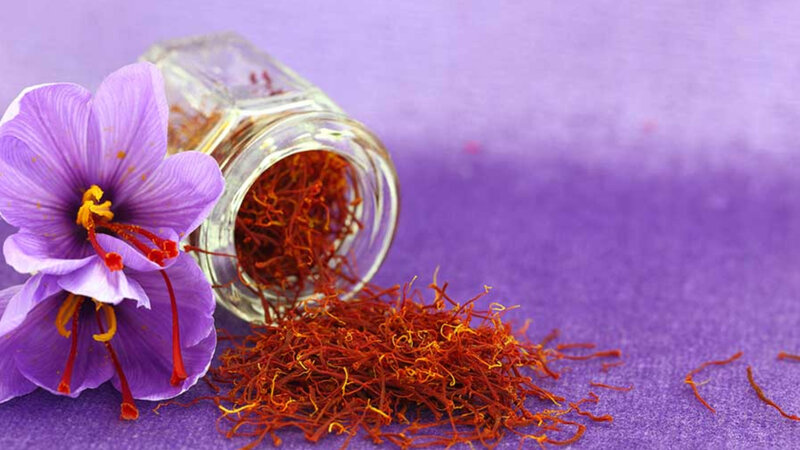Kesar Unleashed: Properties, Benefits & Endless Applications
kesar is a plant that imparts a golden color to culinary creations, originally from Anatolia, present-day Iran. It was introduced to Europe and East Asia by the Arabs and eventually made its way to the Iberian Peninsula in the eighth and ninth centuries.
Beyond its culinary uses, kesar has medicinal properties. This ancient herb was known and studied by Hippocrates, the father of Medicine, and Galen, the father of Anatomy. During their time, the antioxidant, digestive, and antidepressant properties of saffron were recognized.
However, caution must be exercised as high doses of kesar can be lethal. In ancient Rome, saffron was utilized in the form of cushions to alleviate migraines. Ancient Egyptians were also familiar with kesar, employing it for embalming, cosmetic purposes, and as a decorative element.
The flower itself was highly esteemed and featured in engravings and tales from that era. Buddhist monks dyed their robes with Kesar, a practice that continues today as Tibetan lamas still don their distinctive “saffron robes” due to their characteristic color.
Properties Of Kesar
kesar possesses a range of properties that make it valuable not only as a culinary spice but also as a medicinal herb. Here are some notable properties of kesar:
1. Antioxidant
kesar contains several antioxidants, including crocin, crocetin, and safranal. These compounds help protect the body’s cells from oxidative stress caused by free radicals, thereby reducing the risk of chronic diseases and promoting overall health.
2. Anti-inflammatory
kesar exhibits anti-inflammatory properties, which can help reduce inflammation in the body. This property is attributed to the presence of crocin and safranal, which have been shown to inhibit the production of pro-inflammatory substances.
3. Antidepressant
kesar has been traditionally used to alleviate symptoms of depression and improve mood. It is believed that kesar’s active compounds, such as crocin and safranal, influence certain neurotransmitters in the brain, such as serotonin, which plays a role in regulating mood.
4. Anti-cancer
Some studies suggest that kesar may have anticancer effects. Its antioxidant properties help protect against DNA damage, and its anti-inflammatory properties may inhibit the growth of cancer cells. However, further research is needed to fully understand its potential in cancer prevention and treatment.
5. Neuroprotective
kesar has been investigated for its neuroprotective properties, particularly in relation to neurodegenerative diseases such as Alzheimer’s and Parkinson’s. Some studies have shown that kesar extracts can help protect neurons from damage, improve cognitive function, and reduce the risk of age-related brain disorders.
6. Digestive benefits
Kesar has been used traditionally to aid digestion. It can stimulate the production of digestive enzymes, promote healthy bowel movements, and alleviate symptoms of gastrointestinal disorders such as bloating and indigestion.
7. Aphrodisiac
kesar has long been associated with aphrodisiac properties and is believed to enhance sexual desire and performance. It may have a positive effect on libido and reproductive health, although scientific evidence supporting these claims is limited.
kesar Ayurveda Benefits
Cesar holds a significant place in Ayurveda, the traditional system of medicine in India. It is highly valued for its therapeutic properties and is used in various Ayurvedic remedies. Here are some ways saffron is utilized in Ayurveda:
1. Digestive health
Kesar is believed to have carminative properties, which can help improve digestion and alleviate digestive issues such as indigestion, bloating, and flatulence. It is often used in Ayurvedic formulations to enhance digestive fire (agni) and promote healthy digestion.
2. Respiratory ailments
kesar is used in Ayurveda to address respiratory conditions such as cough, asthma, and bronchitis. It is believed to have expectorant properties that help expel phlegm and soothe the respiratory passages. kesar is often used in herbal formulations for respiratory health.
3. Uterine health
kesar is considered beneficial for women’s reproductive health in Ayurveda. It is used to promote healthy menstruation, regulate menstrual cycles, and alleviate menstrual cramps. kesar is also believed to support overall uterine health.
4. Mood and mental well-being
Ayurveda recognizes kesar as a potent herb for promoting mental well-being and emotional balance. It is used to address conditions like anxiety, depression, and mood swings. kesar is believed to have a calming effect on the mind and is often used in Ayurvedic formulations for stress management.
5. Skincare
Kesar is utilized in Ayurvedic preparations for skincare. It is believed to have complexion-enhancing properties and is used to improve the texture, tone, and radiance of the skin. kesar-based face packs, creams, and oils are used to promote healthy and glowing skin.
6. Cardiac health
kesar is considered beneficial for the heart in Ayurveda. It is believed to have cardioprotective properties and is used to support healthy cardiovascular function. kesar is often used in Ayurvedic formulations for maintaining heart health and managing conditions like hypertension.
7. General wellness
kesar is valued as a Rasayana (rejuvenating) herb in Ayurveda. It is believed to promote overall wellness and vitality. kesar is often used in Ayurvedic tonics and formulations to support general health, boost immunity, and enhance vitality.
Ayurvedic usage of saffron may vary based on individual needs and specific Ayurvedic formulations. It is important to consult with an Ayurvedic practitioner or healthcare professional before using saffron for specific Ayurvedic treatments to ensure appropriate and safe usage.
Potential Health Benefits Associated With Saffron
Remember that while saffron offers potential health benefits, individual results may vary, and it should not replace proper medical treatment.
It’s always best to consult with a healthcare professional before using saffron for specific health concerns or if you have any underlying medical conditions.
1. Digestive health
Saffron has been traditionally used to aid digestion and alleviate digestive discomfort. It may help stimulate the production of digestive enzymes, promote healthy gut function, and reduce symptoms of indigestion, bloating, and gas.
2. Cardiovascular health
Some research suggests that saffron may have cardiovascular benefits. It may help lower blood pressure and improve blood lipid profiles by reducing levels of cholesterol and triglycerides. These effects, in turn, may help reduce the risk of heart disease.
3. Anti-inflammatory properties
Saffron exhibits anti-inflammatory properties, which can help reduce inflammation in the body. Chronic inflammation is associated with various health conditions, including arthritis, metabolic syndrome, and certain cancers. By reducing inflammation, saffron may contribute to overall health and disease prevention.
4. Skin health
Saffron is often used in skincare products due to its potential benefits for the skin. It may help improve skin texture, tone, and complexion. Saffron’s antioxidant properties can help protect the skin from damage caused by free radicals and promote a youthful appearance.
5. Respiratory health
Saffron has been used in traditional medicine to alleviate respiratory conditions such as asthma and cough. It may help relax the airways and reduce inflammation in the respiratory system, providing relief from respiratory symptoms.
6. Immune system support
Saffron contains compounds that can help support a healthy immune system. It may have antimicrobial properties, aiding in the prevention and treatment of certain infections. Additionally, saffron’s antioxidant content can strengthen the immune system and protect against oxidative damage.
7. Sexual health
Saffron has a long history of use as an aphrodisiac and is believed to enhance sexual function and libido. It may help improve fertility in both men and women, although further research is needed to fully understand its effects on reproductive health.
8. Weight management
Saffron has been studied for its potential effects on weight management. It may help reduce snacking and curb appetite, which can contribute to weight loss or maintenance. Additionally, saffron’s mood-enhancing properties may help prevent emotional eating.
9. Liver health
Saffron may have hepatoprotective properties, meaning it can help protect the liver from damage. It may support liver function, promote detoxification, and reduce the risk of liver diseases such as fatty liver disease.
10. Diabetes management
Some studies suggest that saffron may have beneficial effects on blood sugar control. It may help regulate insulin levels and improve insulin sensitivity, which can be beneficial for individuals with diabetes or prediabetes. However, more research is needed in this area.
11. Bone health
Saffron contains certain compounds that may have positive effects on bone health. It may help improve bone mineral density and reduce the risk of osteoporosis. These effects can be beneficial in maintaining strong and healthy bones.
12. Anti-aging effects
Saffron’s antioxidant properties can help combat the effects of aging. It may help reduce the appearance of fine lines and wrinkles, promote skin elasticity, and protect against damage caused by environmental factors such as UV radiation.
13. Pain relief
Saffron has been used traditionally to alleviate pain. It may have analgesic properties and can potentially provide relief from conditions such as headaches, menstrual cramps, and joint pain associated with conditions like arthritis.
14. Respiratory health
Saffron has been used in traditional medicine to alleviate respiratory conditions such as coughs and asthma. It may help soothe respiratory passages, reduce inflammation, and ease symptoms related to respiratory ailments.
Note:
It is important to note that while saffron offers potential health benefits, it should be used in moderation. High doses of saffron can be toxic, and it is essential to follow recommended guidelines and consult with a healthcare professional before using saffron for medicinal purposes.
References
- https://en.wikipedia.org/wiki/Saffron
- https://www.britannica.com/topic/saffron
- https://www.webmd.com/vitamins/ai/ingredientmono-844/saffron


























